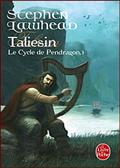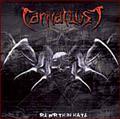SHAKRA (ch) - Everest (2009)

Label : AFM Records / Underclass
Sortie du Scud : 17 avril 2009
Pays : Suisse
Genre : Hard Rock
Type : Album
Playtime : 12 Titres - 51 Mins
On résume souvent la Suisse au chocolat, à la précision des horloges, à l’imperméabilité dénuée d’honnêteté de ses banques, à « Astérix chez les Helvètes » ou encore à Roger Federer. Côté Metal, difficile d’oublier CELTIC FROST et CORONER. Et pourtant depuis quelques années maintenant le Switzerland nous a donné deux groupes solides au style relativement similaire, dont les sorties discographiques régulières et jamais ridicules méritent un tant soit peu d’attention. Je veux parler de GOTTHARD et SHAKRA. Alors si le premier cité récolte quand même le fruit de ses efforts, SHAKRA reste lui dans l’ombre de son aîné.
Pourtant, le quintet emmené par Mark Fox (chant) et Thom Blunier (guitare) sort mine de rien son 7ème album. Maladroitement intitulé Everest, car avec un titre pareil on espère atteindre des sommets, et parfois dans ce cas là on déchante vite. D’autant que là, le titre d’ouverture (« Ashes To Ashes ») mené tambour battant tourne un peu en rond, on s’inquiète d’entrée pour la suite des évènements. On se rassure, en se disant que l’amuse-gueule est servi et que le plat de résistance va arriver.
Et il arrive … Dès la deuxième plage, la machine à tubes est lancée. « Love And Pain », mid-tempo ravageur fait l’effet d’une bombe atomique. Le phénomène SHAKRA et son Hard Rock mélodique répondent présents : la voix éraillée de Fox, la frappe lourde (mais alors ULTRA-lourde) de Roger Tanner, les riffs Heavy et bien gras, le refrain qu’on chante tout le restant de la journée. Alors où est le problème ?!!
Ben le problème, c’est que ce plat de résistance a un goût de trop peu. Il y a bien ce « Regressive Evolution », où la machine fonctionne à plein régime : rythme entraînant, une démarche FM mais qui garde ses grosses boboles péchues, et une intervention juste de Blunier. Oui, ce mec joue juste. Mais ça fait bien mince par rapport aux « Dirty Money » (un Metal bien carré mais bof), « Anybody Out There » (bien essayé pour se diversifier mais trop gentillet), « The Illusion Of Reality » (frappe marquante encore une fois de Tanner mais un refrain trop quelconque), ou encore « Insanity » (trop proche de « Ashes To Ashes »).
Alors je ne voudrais pas faire la morue avec SHAKRA (les Shakras de morue …. Ok je retire), car on relève de nombreux points positifs de ce Everest. Un son fidèle au son « live » de SHAKRA. Une pêche omniprésente. L’assurance d’un groupe qui excelle lorsqu’il ralentit le tempo (en même temps ce sont des Suisses hein …). Sans parler de « The Journey », véritable surprise aux allures de voyage (forcément !), une vraie compo à tiroirs, 7 minutes introduites par des mesures à la DREAM THEATER, alternant rythmes rapides et mélodies plombées, des arpèges dignes d’un James Hetfield, avec un batteur au sommet de son art et une envolée guitaristique de folie. Un super morceau de Hard Rock, c’est grand !
Simplement SHAKRA ne semble pas capable d’enchaîner les titres de ce calibre et casse la dynamique d’Everest avec deux ballades. La ballade sur un album stéréotypé de Hard mélodique, c’est comme le sexe anal dans le X, c’est devenu un passage obligatoire … c’est bien triste …. Ici les guimauves prévisibles se nomment « Why » et « Hopeless ». Rien de bien transcendant …
En allant droit à l’essentiel aussi, SHAKRA aurait marqué des points. 12 titres c’est long, 10 auraient été préférables. Et si possible, 10 titres comme « Love And Pain », « The Journey » ou « Regressive Evolution ». Si Everest va susciter quelques (beaucoup de ?) frustrations chez les fans, fait qu’il ne symbolise pas un virage mal négocié pour SHAKRA. En montagne, ça ne pardonne pas …
Discographie Complète de SHAKRA : Shakra (Album - 1998), Moving Force (Album - 1998), The Live Side (Live - 2000), Power Ride (Album - 2001), Rising (Album - 2003), My Life - My World / Live at Z7 (DVD - 2004), Fall (Album - 2005), Infected (Album - 2007), Everest (Album - 2009)
Ajouté : Samedi 21 Mars 2009
Chroniqueur : NicoTheSpur
Score :   
Lien en relation: Shakra Website
Hits: 15577
|














